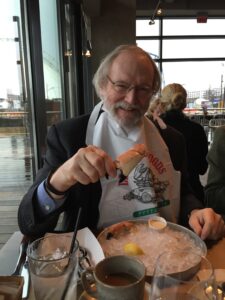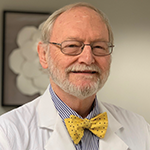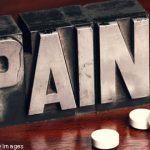Among many of his talents, Dr. Brasington possessed an unusual ability to examine something from various perspectives, says Dr. Kim. “Rick taught me to put as much passion into telling myself why I was wrong as why I was right. He said that if I were so convinced of a diagnosis, then I should take a breather and try to come up with an argument for why I was wrong. Rick often pointed out that our objective measurements aren’t as precise as they should be, so we have to tease out our biases.
“Rick Brasington wasn’t perfect, and everyone who knew him was aware of that. But it was clear that when he did get into a conflict it was not out of malicious intent; it was to ensure those around him were never left out of the conversation. If rules and regulations got in the way of good treatment, well, that wasn’t going to stop him. He would sacrifice himself to defend others. Rick became a close friend and confidant, even performing the wedding ceremony for me and my wife,” says Dr. Kim. “He is terribly missed.”
A Positive Environment
 Echoing Dr. Kim’s sentiments, Jonathan Miner, MD, PhD, associate professor of medicine, University of Pennsylvania, Philadelphia, says, “Rick was the reason I went into rheumatology. I was planning on going into hematology, but Rick was my attending on the rheumatology consulting service during my intern year. His caring demeanor was inspiring to me and others. He made the learning environment positive, and you could see how much joy it brought Rick to be able to teach fellows and treat patients. It made me want to become a rheumatologist.
Echoing Dr. Kim’s sentiments, Jonathan Miner, MD, PhD, associate professor of medicine, University of Pennsylvania, Philadelphia, says, “Rick was the reason I went into rheumatology. I was planning on going into hematology, but Rick was my attending on the rheumatology consulting service during my intern year. His caring demeanor was inspiring to me and others. He made the learning environment positive, and you could see how much joy it brought Rick to be able to teach fellows and treat patients. It made me want to become a rheumatologist.
“Rick never discounted any trainee’s thoughts or ideas. Even when a trainee was wrong, Rick would listen closely, and he would respond supportively to help build the trainee’s confidence. His desire to inspire—and the empathy with which he treated patients and trainees—was exceptional. With patients, Rick would engage in a true, shared decision-making process where he would present the patient with options and ask which they preferred.”
Dr. Miner continues, “I cannot overstate that Rick had a huge halo effect (i.e., his presence made the entire group better); this halo effect went beyond the people in his immediate vicinity. He was the go-to person when anyone had questions about patients or a disease process or training. In fact, Rick’s halo effect was far greater than one institution because of his papers, his impact on former trainees and his role in supporting other doctors all around the U.S. and internationally.

